|
|
|
Sort Order |
|
|
|
Items / Page
|
|
|
|
|
|
|
| Srl | Item |
| 1 |
ID:
177705
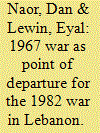

|
|
|
|
|
| Summary/Abstract |
Israel’s 1982 war in Lebanon is one of the most controversial events in its history. It is considered the war of Prime Minister Menachem Begin and his defense minister, Ariel Sharon, and hence a war of choice. One of the historical questions concerning that war revolves around its origins. The widespread assumption is that the roots can be found in 1981, the year in which Israel was on the verge of war with both Syria and the PLO. However, this article claims that the 1967 Six-Day War was the point of departure to the 1982 Lebanon War when the PLO settled in Lebanon. The issue of the origins of the 1982 war is not an exclusively historiographic matter. It has broader implications concerning the nature of the war. If the roots of the conflict can be found in 1967, then the war was a result of a prolonged process. Indeed, Israel started the war, but it was only after other options that it exercised had failed. Hence, it was not at all a war of choice.
|
|
|
|
|
|
|
|
|
|
|
|
|
|
|
|
| 2 |
ID:
185266
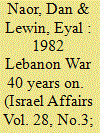

|
|
|
|
|
| Summary/Abstract |
Forty years after its occurrence, the 1982 Lebanon war remains academically understudied with the received wisdom about the conflict largely based on political and journalistic accounts. According to these accounts, the war was a political ploy by Defence Minister Ariel Sharon and Prime Minister Menachem Begin aimed at achieving far-reaching political goals rather than a defensive attempt to remove the terrorist threat to Israel’s northern areas. By placing the conflict within the context of Israeli history and the Arab-Israeli conflict, on the one hand, and the nature and characteristics of modern warfare, on the other, this article offers a more nuanced interpretation of the Lebanon War, showing that it was not fundamentally different from past military encounters.
|
|
|
|
|
|
|
|
|
|
|
|
|
|
|
|
| 3 |
ID:
181307
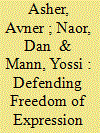

|
|
|
|
|
| Summary/Abstract |
Lebanon is among the most developed Arab countries concerning freedom of expression, and its press and media are famous for their openness and critical approach toward domestic and Arab affairs. The openness and criticism notwithstanding, there are various restrictions, not always formal ones, on the freedom of expression in Lebanon. While much has been written about Lebanese freedom of expression and media, few researches have concentrated on Lebanese political TV satire. This article aims to examine the limits of freedom of expression in Lebanon, as reflected in the various political TV satire shows. The article examined five satire shows: Basmat Watan, La Youmal, Ma Fi Metlo, Chi.N.N. and Awal ‘Ala Akhir. For each show, the article referred to three controversial issues: the attitude toward politics and politicians; the attitude toward Hezbollah and its weapons; and the attitude toward Lebanese presidents, foreign heads of states and Syria. Focusing on the different Lebanese TV satire shows and these contentious subjects reveals how these shows challenge the press and media laws, break taboos and even, to a certain degree, habituate the Lebanese audience to engage with controversial issues.
|
|
|
|
|
|
|
|
|
|
|
|
|
|
|
|
| 4 |
ID:
152608
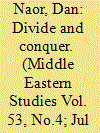

|
|
|
|
|
| Summary/Abstract |
This article examines the attitude of Syria toward Lebanon during the first years of Hafiz al-Assad's regime. Assad adhered to the policy of ‘divide and conquer’, in which Syria purposefully prevented any Lebanese figure from becoming too powerful in the political arena. The article will analyze two cases of prominent Lebanese leaders in which Syria applied this policy, President Suleiman Frangieh and the Druze leader Kamal Jumblatt. Both were close allays of Assad, but this fact did not prevent the latter from acting against his friends. The article's main claim is that by using this policy, Assad paved the way for Syrian intervention and increasing influence in the land of the cedars.
|
|
|
|
|
|
|
|
|
|
|
|
|
|
|
|
| 5 |
ID:
167917
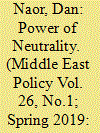

|
|
|
|
|
| Summary/Abstract |
In 1943, on the eve of Lebanon's independence, the Maronite president, Bishara al‐Khuri, and the Sunni prime minister, Riad al‐Sulh, formulated the National Pact, which aimed to regulate political life and bridge the different aspirations of the Lebanese communities. The Pact stipulated that power would be shared on a communal basis. Another aspect of the Pact concerned Lebanese foreign policy. Here, too, the Pact attempted to mediate between the aspirations of the Christians and those of the Muslims. For their part, the Christians — especially the Maronites — aimed for separatism, independence from Lebanon's Arab surroundings, and attachment to the West. The Muslims, particularly the Sunnis, wished to connect with the Arab world, especially with Syria. Hence, the Pact stipulated that Lebanon should take the middle road, adhering neither to East nor West. In fact, the Pact dictated a kind of neutrality in foreign affairs, enabling Lebanon to act as a middle man, a connecting factor between opposing elements.
|
|
|
|
|
|
|
|
|
|
|
|
|
|
|
|
| 6 |
ID:
124971
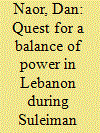

|
|
|
|
|
| Publication |
2013.
|
| Summary/Abstract |
This paper examines the changes in the balance of power in domestic and foreign arenas in Lebanon during the regime of President Suleiman Frangieh between the years of 1970 and 1976. Changes occurred in both arenas which influenced the stability of the regime and led the country to a civil war. In the domestic political arena, the regime ceased to rely on a Maronite-Sunni-Shiite axis and began to rely firstly on a Maronite-Shiite axis, and then on a Maronite-Druze axis. These steps aroused the Sunni establishment against the regime and led to instability. In the foreign arena, the regime exchanged their policy of neutrality on Arab and international arenas in favour of leaning towards 'revolutionary' Arab countries such as Syria, Iraq and Libya. This led to a rise in the influence and intervention of these Arab countries in Lebanese political affairs and escalated the turbulence on the streets of Lebanon against the Frangieh regime.
|
|
|
|
|
|
|
|
|
|
|
|
|
|
|
|
| 7 |
ID:
133747
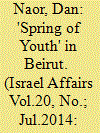

|
|
|
|
|
| Publication |
2014.
|
| Summary/Abstract |
This article examines the impact that Operation Spring of Youth, carried out by the Israel Defence Forces (IDF) on 10 April 1973 had on Lebanon. IDF Special Forces infiltrated the heart of Beirut and eliminated three senior members of the Black September organization, perpetrator of the 1972 Munich Olympics massacre. While Israelis celebrated the successful military operation, the Lebanese mourned. Following the Israeli raid, the Lebanese government resigned, and an armed conflict erupted between the Lebanese army and the Palestinian organizations, leading to both domestic and inter-Arab crises. When these clashes ended, the Lebanese government had been unable to enforce its authority over Palestinian organizations, and Lebanon's weakness was publicly exposed.
|
|
|
|
|
|
|
|
|
|
|
|
|
|
|
|
| 8 |
ID:
192276
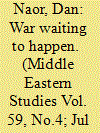

|
|
|
|
|
| Summary/Abstract |
The 1982 Lebanon War is one of the most controversial events in Israeli history. The prevailing narrative of this war states that it was a war of deception, a war in which Defense Minister Ariel Sharon deceived Prime Minister Menachem Begin and the entire Israeli government. However, this narrative does an injustice to Menachem Begin. In this narrative, Begin is perceived as a victim, as one who was deceived by his defense minister. Begin had a much more significant role. This article claims that in terms of Menachem Begin’s policy toward Lebanon, the Lebanon War was an event waiting to happen. The main argument is that from the moment Menachem Begin came to power in 1977, a countdown to a comprehensive action in Lebanon was started. The decisions and actions taken by Begin and his governments in the years preceding 1982, paved the way to the Lebanon War.
|
|
|
|
|
|
|
|
|
|
|
|
|
|
|
|
| 9 |
ID:
191899
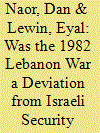

|
|
|
|
|
| Summary/Abstract |
On June 6, 1982, Israel invaded Lebanon with the aim of destroying the military infrastructure of the Palestine Liberation Organization (PLO), which was serving as a launching pad for terrorist infiltrations and Katyusha attacks into northern Israel. From its outset, the Israeli public considered the war an exceptional case and a deviation from the “proper” course of Israeli history. Allegedly, unlike other Israeli wars, the 1982 War did not relate to Israeli security concerns but instead to the political aims and whims of Menachem Begin and Ariel Sharon. Also, it is often described as an unjust war of choice, which Israel initiated while it was not facing an existential threat. The claim that the 1982 Lebanon War was exceptional and a deviation from original Israeli principles is the main interest of this article. To determine whether the Lebanon War was a breach of Israeli history or a deviation from Israeli foundational political-moral principles, one must analyze the core tenets of Israel’s security strategy to which it adhered in most of its battles. Using the security doctrine as a guide map reveals that the conflict was neither unique nor a deviation but rather a fulfillment of long-standing Israeli security principles.
|
|
|
|
|
|
|
|
|
|
|
|
|
|
|
|
|
|
|
|
|